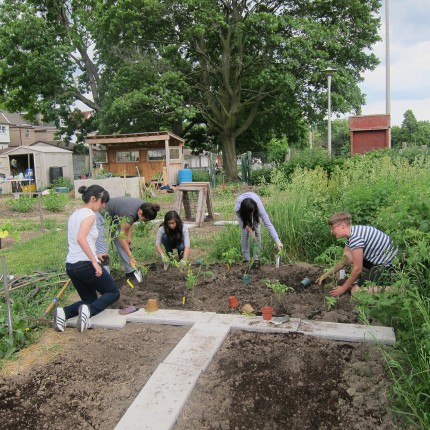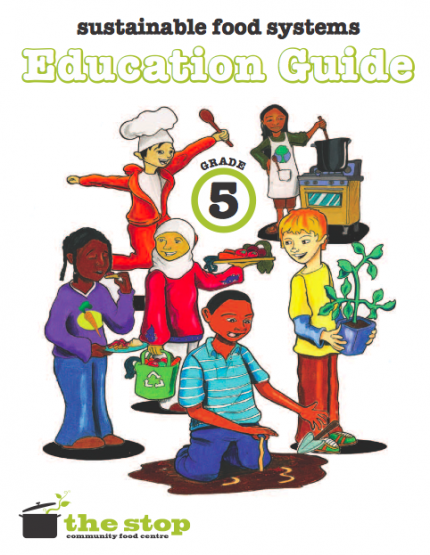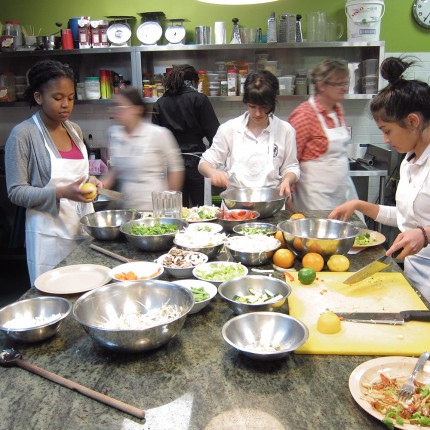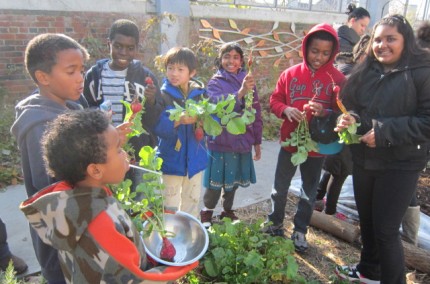The Stop’s Wide Reach in Good Food Education
Posted: November 4, 2014
Categories: Edible Education Network / Edible Education Project Profiles / GoodFoodBites
 “Charity is like a bandaid. It only helps for that time, but when it’s done you have the same problem,” a grade 5 student shares.
“Charity is like a bandaid. It only helps for that time, but when it’s done you have the same problem,” a grade 5 student shares.
These are the sort of powerful remarks and lessons learned from students engaged in The Stop’s education programming.
The Stop Community Food Centre’s education programming focuses on creating positive experiences with healthy food, connecting the health of an individual with the health of their community, while adding a compelling social justice perspective.
Their community-oriented education engages children and youth in growing, cooking, eating and sharing healthy food, all through a variety of programs and activities that help young people gain an understanding of food system issues, and develop leadership skills that pertain to their lives. Always looking to meet the needs of participants, The Stop seeks out opportunities to adapt, work with and support others through good food education.
Xuan-Yen Cao, one of The Stop’s Education Coordinators, tells us how building and maintaining relationships are paramount for this sort of work – whether it’s with teachers, principals, parents, or the youth themselves, it all boils down to relationship building. And with schools in their community as a priority, they have been doing school visits for years, as well as inviting these schools to their established Earlscourt Community Garden and the Green Barn (a sustainable food production and education centre), something Xuan-Yen says is essential. The education program is comprised of two Education Coordinators, Xuan-Yen and Kanaka Kulendran. They also work with a strong team of volunteers, students and collaborate with other staff, who are integral in supporting hands-on programming.
A complex, multi-program, multi-initiative organization, their funding comes from a wide array of sources, including their own passionate fundraising team. Other support comes from an assortment of small private grants, foundations and donors.
Through their number of diverse programs, The Stop hopes to have a broader impact and reach in the community. Below we explore their five education programs:
Sustainable Food Systems Education
For many years, The Stop has provided fun and engaging workshops for children in Davenport West and St. Clair West/Christie schools in an effort to involve youth, their teachers and the wider community in the political and environmental issues that relate to food production and consumption through a Sustainable Food Systems Education program for grades 3 and 5. The four-part program for grade 5 students highlights the intersection of food, social justice, environmental and health issues. For youth aged 9-11 this program not only increases knowledge of healthy food issues but also encourages youth to think for themselves. Grade 3 classes also visit The Stop’s Green Barn in the spring for a specific workshop on soil production and planting. Both the grade 3 and 5 programs reinforce integral concepts of the Ontario curriculum including arts, health and physical education, language (oral and media studies), social studies, geography, science and even math.
Food Leadership for Youth (FLY) is a program for individuals that identify as girls aged 13-17 from low-income families. Since teenage girls can often face conflicting messages about food, healthy eating habits and their bodies, FLY aims to provide a space where girls can gain necessary social support, and boost their self-esteem and confidence while developing cooking and nutrition skills. In the past couple years, FLY has also expanded to include additional workshops with other youth agencies. This upcoming school year, they are looking to build further capacity for youth by providing training and volunteer opportunities for them to get involved in various gardening and food initiatives at The Stop.
Xuan-Yen happily recalls participants coming back for a visit and they’re eating healthier, they’ll comment on how it has positively impacted their family, they’ve started to make their own lunches and buy vegetables, and some have even moved on to pursue post-secondary education in environmental, gardening or culinary programs.
One FLY participant shares: “I went into the program and I was learning all these sorts of things and it made me more confident, and I was cooking at home and I was learning about real ingredients and what local and organic food meant and from that I definitely, I feel like I got more confident with food. And food is something that I love, so it made me feel better about myself somewhere down the line.”
As touched on earlier, relationship building was key here – they connected with one high school in particular where the principal was very keen on the program, allowing them to come into the school to connect with the girls. Xuan-Yen reminds us how important it is to talk with teachers and principals and gain a champion in schools; sometimes teachers will gather other teachers and once you’ve gained some momentum it just keeps growing.
After-School Program & Kids’ Club
The Children’s After-School Programs have been running for 5 years. The programs are committed to developing younger generations that are healthy, food literate and empowered citizens. These programs target children from low-income families during their formative years, between 7 and 13 years of age. In the program, children learn how to grow, cook and develop an understanding and appreciation for culturally-relevant, healthy, local, fresh food. Through a hands-on approach, children develop a closer connection to their food and become empowered to make healthier food choices.
Through interactive and engaging activities, children also gain a greater understanding of how the food system works: where food comes from, how it is produced, processed and distributed, and why access to food differs depending on socioeconomic, geographic factors and other intersections of identity including race, gender, sexual orientation, ability and so forth.
is produced, processed and distributed, and why access to food differs depending on socioeconomic, geographic factors and other intersections of identity including race, gender, sexual orientation, ability and so forth.
In its sixth year, the After-School Program is going through some changes and will be embarking on key partnerships with other after-school programs in the Davenport West community to offer programming to children and families that face systemic barriers that prevent access to healthy food. Xuan-Yen tells us they’re always open to new opportunities to connect with other agencies in their community, as it is valuable to engage with existing programs out there that don’t have the capacity themselves to necessarily run hands-on gardening and cooking activities.
Back to the important theme of building relationships, Xuan-Yen shares how getting engaged and partnering in the community is so helpful in making these programs successful and allowing for growth. She also offers other tips: interact with the parents’ council, go to school fairs and events to meet parents, engage kids, and go into classrooms!
Summer Camps, Children and Youth Summer Gardening Program
The Stop has also run week-long summer camps for a few years. These camps provide children with a short but intensive sample of what The Stop’s children’s programs offer. They have also provided cooking and gardening programs for visiting day camps and daycares in the Davenport West and St. Clair community. By doing so, they reach more children and involve them in maintaining the Sheltered Garden at the Green Barn. Neighbouring summer camps, youth agencies and daycares also come to the The Stop’s Earlscourt Park garden to engage in garden-based activities.
Education Workshops, Consultation and Training
For the past few years, The Stop has been consistently invited to present at conferences, facilitate workshops and participate in events such as the University of Toronto OISE Environmental Education Sustainability Conference and Beyond Green Youth Conference.
They plan on continuing to participate in these important events to further push for the mandate/vision of the organization and further support the growth and training of teachers, educators and community organizations and agencies, who are looking to incorporate school food gardening and food justice principles in their curriculum.
“by supporting and participating in the larger school food gardening movement, we will not only be able to feed knowledge, information and experience back into our own programs and organization, but we will also be able to support the larger education movement and engage with educators, having a greater impact on more children, youth and families.”
For this profile, we spoke with:
Xuan-Yen Cao
Education Coordinator
The Stop Community Food Centre
416-651-7867 x26
This profile is part of a series of profiles for the Ontario Edible Education Network.
Be sure to check out more profiles from the Network here!

